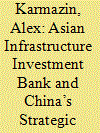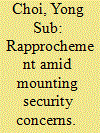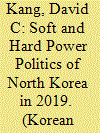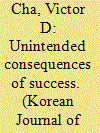|
|
|
Sort Order |
|
|
|
Items / Page
|
|
|
|
|
|
|
| Srl | Item |
| 1 |
ID:
166012


|
|
|
|
|
| Summary/Abstract |
Creating the Asian Infrastructure Investment Bank (AIIB), a multilateral development bank initiated by the People’s Republic of China, has been one of the key symptoms of Xi Jinping’s ambitious “China Dream” foreign policy. The previous studies mainly focused on providing a description of AIIB’s creation or general motives and context through which they explicated the establishment of the Bank. Building on the literature focused on strategic culture and grand strategy, I supplement the general motives of AIIB’s creation by characterizing the style and process of AIIB’s materialization. I argue that the style (procedure) of AIIB’s implementation largely resembles the previous Dengian model of strategic procedure which Deng himself described with the Chinese saying “crossing the river by touching the stones” which evinces flexibility and “step-by-step” characteristics in its procedure. This helps to illustrate that China’s engagement with the international order can be adaptive to a significant degree and China does not necessarily follow a pre-planned vision of how to take over international (institutional) order. While China’s foreign policy in some areas is often regarded as being assertive and rigidly defending its positions, AIIB is a different case to a high extent. Moreover, analyzing the creation of AIIB indicates ambiguity of Xi’s foreign policy regarding general aims it wants to achieve and identities on which it should be based.
|
|
|
|
|
|
|
|
|
|
|
|
|
|
|
|
| 2 |
ID:
166009


|
|
|
|
|
| Summary/Abstract |
The main goal of this article is to explain the American failure of deterring North Korean nuclear proliferation. Specically, it examines the underlying reasons for which U.S. inhibition policy toward North Korea has failed, despite the numerous attempts by U.S. administrations (both Republicans and Democrats) to prevent North Korea’s nuclear development. The central thesis of the article is that while there were multiple reasons for the American failure of North Korean proliferation, the most important ones were U.S. misperceptions about both North Korea’s and China’s intentions and U.S. distraction by the war on terror. These factors, along with Pyongyang’s shrewd strategies to manipulate Washington, Seoul, and Beijing, played a key role in the emergence of a nuclear North Korea.
|
|
|
|
|
|
|
|
|
|
|
|
|
|
|
|
| 3 |
ID:
166008


|
|
|
|
|
| Summary/Abstract |
In light of a second Kim–Trump summit this article reviews the posture of Russia and China and suggests that not only do they have an alliance but that it also includes to some degree North Korea. Moscow and Beijing have endorsed Pyongyang’s negotiating posture and much evidence suggests a Russo–Chinese alliance, albeit an informal one. Such an alliance possesses immense implications for the ongoing efforts to nd a negotiated path out of the Korean nuclearization crisis and for regional security in general. But in the meantime the advent of such an alliance imparts a quality of regional bipolarity to the Northeast Asian security agenda that could obstruct further progress towards peace.
|
|
|
|
|
|
|
|
|
|
|
|
|
|
|
|
| 4 |
ID:
166011


|
|
|
|
|
| Summary/Abstract |
This study analyzes the debate on Pakistan’s nuclear weapons program among the Pakistani elites, who include scientists, strategists and politicians. The study examines the nuclear doctrine that emerges from this, as well as the likely ways in which it can impact peace and stability on the Indian subcontinent. It also underlines the possible inuence of the Pakistani nuclear doctrine on the nuclear doctrine of other “unrecognized” emerging nuclear weapon states such as North Korea. After its creation and independence in August 1947, Pakistan’s elites considered survival to be the primary national strategic objective of the country in the harsh international environment, especially with regards to India. This understanding shaped Pakistan’s security policy in the early years, post August 1947. The three wars Pakistan fought with India proved that the collective security policy and the anti-nuclear weapons advocacy by Pakistani defensive realists was not the best strategy in the prevailing security environment. In this backdrop, the Multan meeting in January 1972 initiated a fierce debate on whether a nuclear weapons program was the best strategy for ensuring national security. The participants included defensive realists, offensive realists, liberals and separatists. The offensive realists won the debate, shaped Pakistan’s nuclear policy, and initiated its nuclear weapons program. Separatists here refer to the sub-nationalist forces that seek political separation from Pakistan.
|
|
|
|
|
|
|
|
|
|
|
|
|
|
|
|
| 5 |
ID:
166010


|
|
|
|
|
| Summary/Abstract |
The 1998–2007 inter–Korean reconciliation was paradoxical because there were aggravating military tensions during the same period. To solve the security puzzle, this paper employs a Gramscian approach and argues that the reconciliation was pursued as hegemonic projects by the ruling political groups in North and South Korea. In South Korea, the economic crisis in 1997 led counter-hegemonic liberal nationalists to take political power, and the new ruling political group implemented the engagement policy toward Pyongyang to attain hegemony. In North Korea, the existing ruling political group sought to reconcile with Seoul, mostly for material gains to maintain hegemony by stopping the ongoing economic crisis from developing into a political crisis without a full–scale reform of the system. In the process, each capitalized on unication nationalism, which had a strong national– popular force because of the division of Korea. The rapprochement was carried out primarily to exhibit their contributions to unication, which could be signicantly conducive to their winning the domestic struggle for hegemony.
|
|
|
|
|
|
|
|
|
|
|
|
|
|
|
|
| 6 |
ID:
166007


|
|
|
|
|
| Summary/Abstract |
Despite the media attention to North Korean missile launches and American shows of force in 2017, war was never a realistic possibility. Deterrence and the costs of war are far too high for either side to seriously contemplate using force to resolve the Korean Peninsula standoff. Deterrence will also continue to hold into the future, barring some unforeseen circumstance. In this case, when war is not an option, what do countries do? What role does soft power play in diplomacy? States resort to hard power rarely and with great caution, precisely because the stakes are so high.
But just because countries are not going to war over an issue does not mean it is unimportant. In this sense, exploring how countries compete or engage in the push and pull of diplomacy below the threshold of hard and military power is a relatively understudied phenomenon. For North Korea, it is clear that a long-term strategy of focusing on diplomacy abroad and economic reforms at home is following a push to nuclearize. Only by understanding this emerging North Korean strategy can the United States and South Korea craft appropriate strategies for dealing with this intractable problem.
|
|
|
|
|
|
|
|
|
|
|
|
|
|
|
|
| 7 |
ID:
166006


|
|
|
|
|
| Summary/Abstract |
Prudent leaders must always contemplate the unintended consequences of their foreign policy successes, particularly when those secondary consequences create negative externalities. In this article, I look at whether the unintended consequence of the South Korean government’s push for a peace declaration on the Korean peninsula could create the conditions by which the United States, led by an impulsive American president, could withdraw U.S. troops from the Korean peninsula. I first document the rationale behind the South Korean government’s approach to peace diplomacy with North Korea. I then examine the concept of the peace declaration, which is different from a ratiable treaty, and the “catch-22” of this declaration as it relates to denuclearization of the Korean peninsula. Finally, I analyze how a supercial peace declaration will not address core national security concerns of either ally, and how it could create unintended consequences with regard to troop drawdowns. This research features an original and unique dataset that documents Donald Trump’s transactional view of U.S. military commitments to its allies over the past three decades.
|
|
|
|
|
|
|
|
|
|
|
|
|
|
|
|
|
|
|
|
|